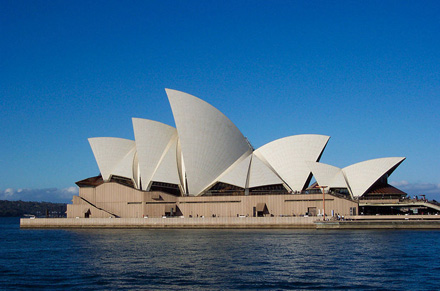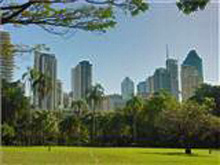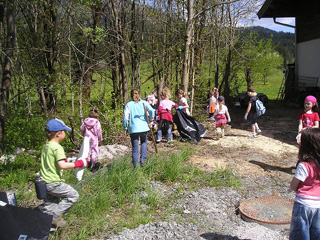Navigation
Australians Embrace Climate Neutrality on National Day : Carbon Neutral Initiatives Planned Nationwide
Traditionally celebrated by having a family barbecue or going to the beach, this year’s Australia Day -- marked nationwide on 26 January 2009 -- is all about going carbon neutral for some of the country’s best-known cities, companies and community initiatives.
 |
| Sydney Opera House, clearly showing the outline of its "sails." Photo by Enoch Lau on 20 July 2004. |
Traditionally celebrated by having a family barbecue or going to the beach, this year’s Australia Day -- marked nationwide on 26 January 2009 -- is all about going carbon neutral for some of the country’s best-known cities, companies and community initiatives.
From the country’s best-recognized cities to one of its most successful public campaigns, these Australian brands have embraced the vision of low-carbon economies and societies by joining the Climate Neutral Network (CN Net), an initiative led by the United Nations Environment Programme (UNEP) to promote global action and involvement in climate neutrality at all levels.
Achim Steiner, UN Under-Secretary-General and UNEP Executive Director, said: “Combating climate change is the challenge of this generation. But it is also perhaps one of the greatest opportunities for transforming economies, triggering innovation, sparking human creativity and generating jobs now and in the future.”
“These new Australian members of the CN Net are, therefore, signalling their commitment to a Green Economy so urgently needed in the 21st century—one able to deal with the multiple crises of today and the ones to come. In doing so they are also supporting Australia’s renewed leadership on global warming in advance of the crucial UN Climate Convention meeting in Copenhagen now less than 317 days away”, he added.
With its world-famous Opera House, the “Coathanger” Bridge and the Harbour as its backdrop, Sydney is one of the world’s most spectacular cities. In 2007, the City of Sydney became Australia’s first carbon neutral local government. The City is implementing a wide range of initiatives to avoid carbon emissions and respond to climate change – from installing energy-efficient street lighting to creating a network of cycling paths to investigating alternative waste treatment options.
Lord Mayor of Sydney Clover Moore said: “The City of Sydney is proud to be the first carbon neutral government in Australia. Though the emissions from the City of Sydney alone are small in terms of state, national and global emissions, we believe that our leadership can influence other governments by demonstrating that change is possible. The UNEP Climate Neutral Network is a significant opportunity to provide information and share experiences with a wide audience."
 |
| Brisbane City Council will incorporate the principles of ecologically-sustainable development into our business and management systems and decision-making processes, to ensure the city’s environment and resource efficiency improves over time. The city is also spearheading the two million trees planting project. Photo: CN Net |
Brisbane is Australia’s third largest city and aims to become carbon neutral by 2026. Through the Green Heart CitySmart programme, Brisbane City Council promotes the use of solar hot water systems after having estimated that traditional hot water systems chew up 28% of household energy consumption.
In the area of transport, the city has recently pioneered Australia’s first public bicycle hire scheme and introduced the “superbus,” a 14.5-metre low-emissions bus capable of carrying up to 98 passengers.
 |
| Greenfest is Brisbane's free green festival starting on World Environment Day, Friday 5th June 2009, Brisbane City Botanic Gardens and continues to Sunday 7th June. This year we celebrate Brisbane's 150th birthday and welcome those promoting foundations for a cooler planet. Our theme for 2009 is "Community Warmth Can Cool the Planet!", with a focus on fresh conservation, community development and clean technology. Photo: CN Net |
Another CN Net participant from Brisbane is Greenfest – a three-day-long grassroots, free-to-the-public, music festival which will kick off on World Environment Day, 5 June.
This year’s focus of the event is sharing the passion for a cooler planet and creating awareness about the importance of the UN climate negotiations in Copenhagen in December 2009.
A further new member is Clean Up the World. The brainchild of Australian solo-yachtsman and builder Ian Kiernan, the Clean Up the World campaign grew from the highly successful Clean Up Australia Day first held almost 20 years ago.
 |
| Wallaby Lakefield Little Rock Narbarlek Invitation to Greenfest: “We would like to invite communities and organizations from around the world to exhibit and help us build a critical mass of positive energy in one place at one time every year. If your innovative commercial organization or community group wants to share ideas and actions for the future.” Photo: CN Net |
Today it mobilizes an estimated 35 million volunteers from 120 countries annually, making it one of the largest community-based environmental campaigns in the world.
“Climate change is an indisputable fact, backed up by science. But rather than simply despairing we need to work together to find creative and sustainable solutions that allow us to reduce human impact and learn to live in harmony with our planet. Adopting carbon neutrality as accepted business practice is more than just possible, it’s an imperative.
 |
| Clean Up the World was established in 1993 after Clean Up Australia founder, Ian Kiernan approached the United Nations Environment Programme (UNEP), with an idea to take his Clean Up Australia concept global. Here children Clean up (Flurreinigung) St. Johann in Tirol Austria Europe 2008 Photo by Eigenes Werk Text Wikipedia. |
Clean Up the World is proud to be part of a network that encourages innovative thinking, shares experiences and rewards the achievement of practical carbon reduction strategies,” said Mr Kiernan.
Based in Adelaide, BalanceCarbon is the first carbon management company formed in Australia by specialist environmental professionals. The company has been carbon neutral since its inception through the combination of greenhouse gas emission reductions and offsets, and aims to reduce its absolute emissions at a rate of 5% per year.
Contacts:
Nick Nuttall, UNEP Spokesperson and Head of Media,
Or:
Xenya Cherny Scanlon, Information Officer, Climate Neutral Network
Further information on the Climate Neutral Network can be found at www.unep.org/climateneutral
Note:
See related articles on the Horizon Solutions Site http://www.solutions-site.org/
Search
Latest articles
Agriculture
- World Water Week: Healthy ecosystems essential to human health: from coronavirus to malnutrition Online session Wednesday 24 August 17:00-18:20
- World Water Week: Healthy ecosystems essential to human health: from coronavirus to malnutrition Online session Wednesday 24 August 17:00-18:20
Air Pollution
- "Water and Sanitation-Related Diseases and the Changing Environment: Challenges, Interventions, and Preventive Measures" Volume 2 Is Now Available
- Global Innovation Exchange Co-Created by Horizon International, USAID, Bill and Melinda Gates Foundation and Others
Biodiversity
- It is time for international mobilization against climate change
- World Water Week: Healthy ecosystems essential to human health: from coronavirus to malnutrition Online session Wednesday 24 August 17:00-18:20
Desertification
- World Water Week: Healthy ecosystems essential to human health: from coronavirus to malnutrition Online session Wednesday 24 August 17:00-18:20
- UN Food Systems Summit Receives Over 1,200 Ideas to Help Meet Sustainable Development Goals
Endangered Species
- Mangrove Action Project Collaborates to Restore and Preserve Mangrove Ecosystems
- Coral Research in Palau offers a “Glimmer of Hope”
Energy
- Global Innovation Exchange Co-Created by Horizon International, USAID, Bill and Melinda Gates Foundation and Others
- Wildlife Preservation in Southeast Nova Scotia
Exhibits
- Global Innovation Exchange Co-Created by Horizon International, USAID, Bill and Melinda Gates Foundation and Others
- Coral Reefs
Forests
- NASA Satellites Reveal Major Shifts in Global Freshwater Updated June 2020
- Global Innovation Exchange Co-Created by Horizon International, USAID, Bill and Melinda Gates Foundation and Others
Global Climate Change
- It is time for international mobilization against climate change
- It is time for international mobilization against climate change
Global Health
- World Water Week: Healthy ecosystems essential to human health: from coronavirus to malnutrition Online session Wednesday 24 August 17:00-18:20
- More than 400 schoolgirls, family and teachers rescued from Afghanistan by small coalition
Industry
- "Water and Sanitation-Related Diseases and the Changing Environment: Challenges, Interventions, and Preventive Measures" Volume 2 Is Now Available
- Global Innovation Exchange Co-Created by Horizon International, USAID, Bill and Melinda Gates Foundation and Others
Natural Disaster Relief
- STOP ATTACKS ON HEALTH CARE IN UKRAINE
- Global Innovation Exchange Co-Created by Horizon International, USAID, Bill and Melinda Gates Foundation and Others
News and Special Reports
- World Water Week: Healthy ecosystems essential to human health: from coronavirus to malnutrition Online session Wednesday 24 August 17:00-18:20
- STOP ATTACKS ON HEALTH CARE IN UKRAINE
Oceans, Coral Reefs
- World Water Week: Healthy ecosystems essential to human health: from coronavirus to malnutrition Online session Wednesday 24 August 17:00-18:20
- Mangrove Action Project Collaborates to Restore and Preserve Mangrove Ecosystems
Pollution
- Zakaria Ouedraogo of Burkina Faso Produces Film “Nzoue Fiyen: Water Not Drinkable”
- "Water and Sanitation-Related Diseases and the Changing Environment: Challenges, Interventions, and Preventive Measures" Volume 2 Is Now Available
Population
- "Water and Sanitation-Related Diseases and the Changing Environment: Challenges, Interventions, and Preventive Measures" Volume 2 Is Now Available
- "Water and Sanitation-Related Diseases and the Changing Environment: Challenges, Interventions, and Preventive Measures" Volume 2 Is Now Available
Public Health
- Honouring the visionary behind India’s sanitation revolution
- Honouring the visionary behind India’s sanitation revolution
Rivers
- World Water Week: Healthy ecosystems essential to human health: from coronavirus to malnutrition Online session Wednesday 24 August 17:00-18:20
- Mangrove Action Project Collaborates to Restore and Preserve Mangrove Ecosystems
Sanitation
- Honouring the visionary behind India’s sanitation revolution
- Honouring the visionary behind India’s sanitation revolution
Toxic Chemicals
- "Water and Sanitation-Related Diseases and the Changing Environment: Challenges, Interventions, and Preventive Measures" Volume 2 Is Now Available
- Actions to Prevent Polluted Drinking Water in the United States
Transportation
- "Water and Sanitation-Related Diseases and the Changing Environment: Challenges, Interventions, and Preventive Measures" Volume 2 Is Now Available
- Urbanization Provides Opportunities for Transition to a Green Economy, Says New Report
Waste Management
- Honouring the visionary behind India’s sanitation revolution
- Honouring the visionary behind India’s sanitation revolution
Water
- Honouring the visionary behind India’s sanitation revolution
- Honouring the visionary behind India’s sanitation revolution
Water and Sanitation
- Honouring the visionary behind India’s sanitation revolution
- Honouring the visionary behind India’s sanitation revolution

